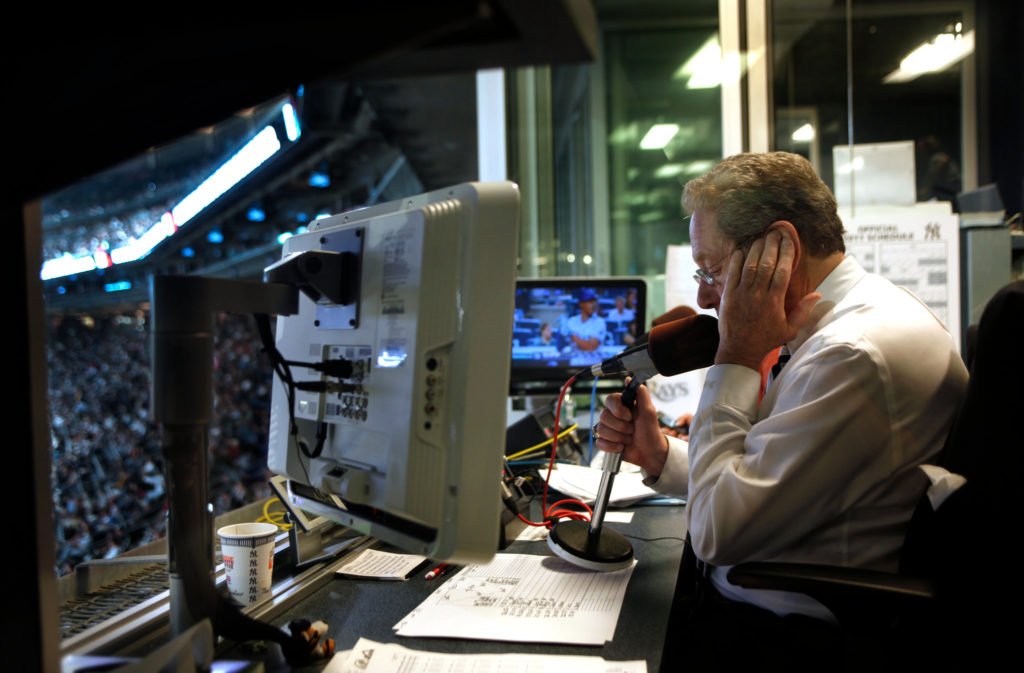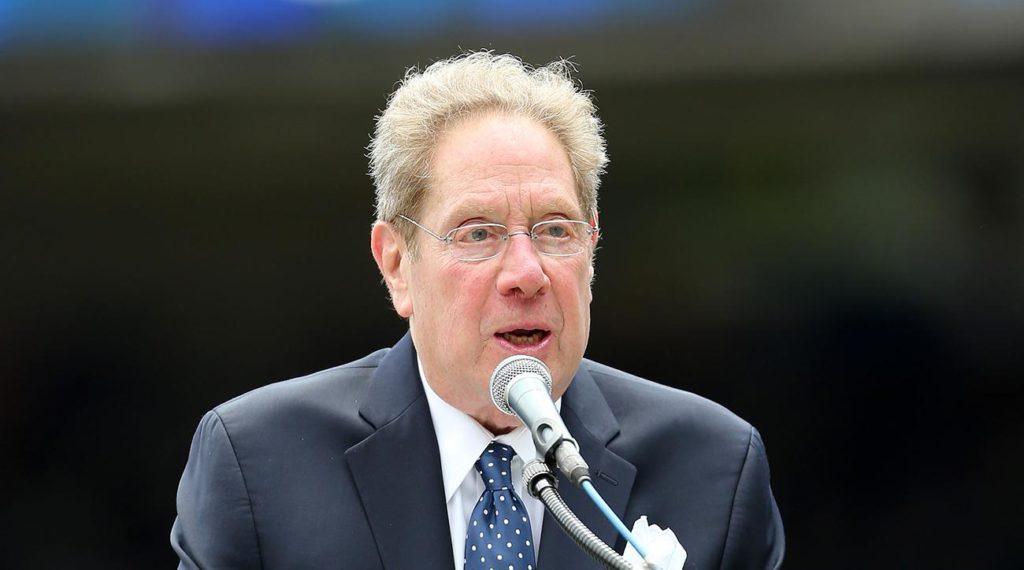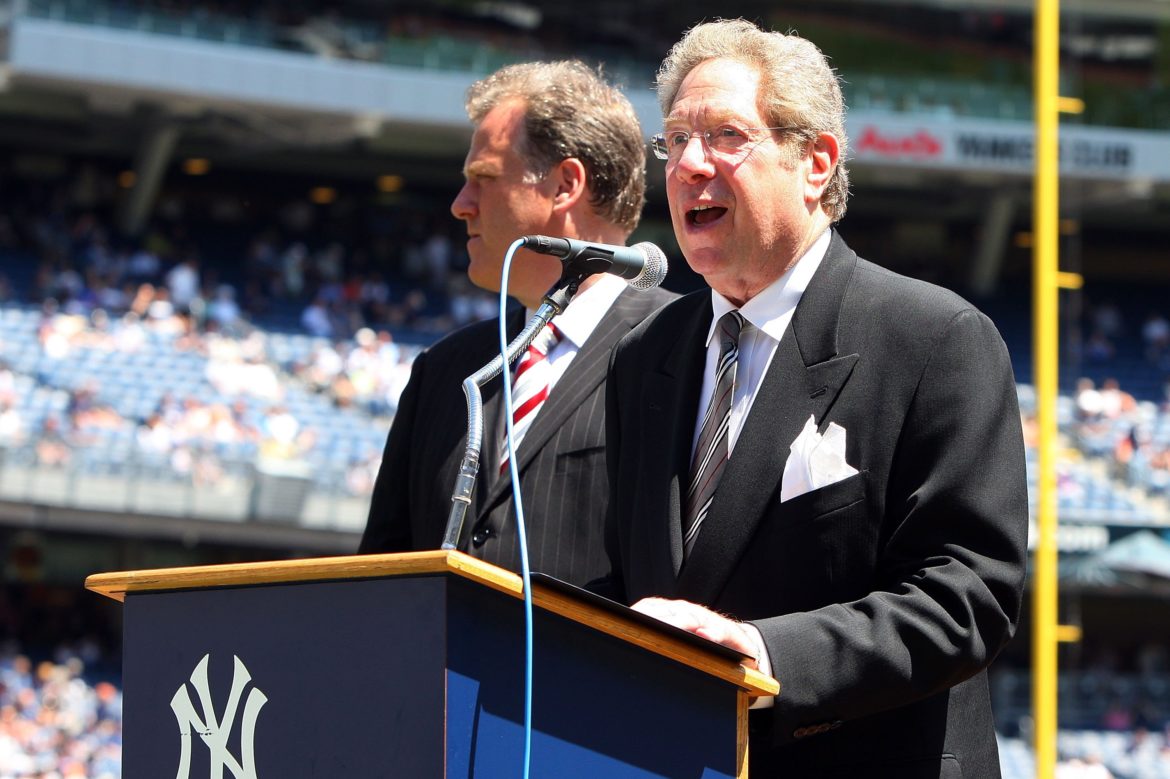(In late 2011, I was fortunate to have a lengthy phone interview with Yankees radio broadcaster John Sterling, now 81 years old and still going strong. This story ran in the former “Diamond Nation Magazine.” John was gracious, engaging and humble, as Yankee broadcast listeners have come to expect.)
When John Sterling picks up the phone at his Edgewater home, he sounds like he’s in the middle of a radio broadcast, perhaps discussing the intricacies of a double-switch during a Yankees interleague game.
The voice is crisp, deep and with purpose. Sterling gives the impression he’ll never be caught grabbing the phone half-asleep and with a frog in his throat.
It’s difficult not to imagine Sterling turning the phone conversation immediately into a home run call; “I am home. You are on. Now you’re gone!
“I’m in the middle of sending out my Christmas cards,” said Sterling after perfunctory introductions. “I’ve got 75 of them to get through. What can I do for, old boy?”
Sterling has done well for baseball fans and radio listeners, particularly for Yankees fans, since joining the Yankees broadcast booth in 1989. His booming voice, passion for the game and home run calls have made for daily dissection by tri-state area fans.
That’s what makes it difficult to believe that Sterling and broadcast partner Suzyn Waldman were perhaps facing their final Yankees broadcast at the end of the 2011 baseball season.
“Our five-year contract (with the Yankees) was up,” said Sterling, “so everyone had a chance to get it.” Rumors had ESPN, among others, interested in landing the Yankees broadcast. “We ended up re-upping for one-year. But CBS and the Yanks are working on bigger things, much bigger things for the future.”
Sterling’s assured return to the booth is good news for Yankees radio listeners, most of whom appreciate the passion and knowledge he brings to each broadcast. Well, most listeners.

While Sterling gets needled, even castigated, by critics for what some feel is an unnecessary habit of turning Yankees broadcasts into his personal playground, none can question his ability to break down every aspect of a game and provide insight on game strategies. Fans want to know and discuss what the Yankees should, would or will do in certain situations, and Sterling lays those options out as well as any commentator.
Crack, “There it goes to deep right. It is high. It is far. Iiiiiit is GONE! Ball game over. Yankees win! Theeeeee, Yankees, Win!” Hearing a Sterling game-winning home run call is nirvana for Yankees fans. It’s “ball-game over, we win.” Sterling is the hometown broadcaster playing it straight until he can no longer contain his emotions. He’s Phil Rizzuto on steroids. He’s a fan in the booth and the fans want their hometown guy to root for their team.
Equally important to the listener, Sterling, despite a voice that can come off as highbrow, is, like Rizzuto, self-deprecating. “What do I know? I’m just another fan like you trying to figure this out,” he can be heard saying on any of a number of broadcasts.
“I’m really just someone who loves baseball,” says Sterling. “I’m a big fan.” No argument.

Sterling’s list of signature home calls continues to grow. The jumping off point is believed to be, at least in his tenure with the Yankees, was a playoff home run by Bernie Williams in 1996. Sterling blurted out, “Bern’ Baby Bern!”
“It goes back to when I was doing Atlanta Hawks broadcasts in the 80s,” said Sterling. “I did a bunch of ‘Dominique is Magnifique’ calls in reference to Dominique Wilkins and it caught on with the fans.”
He turned heads with his “The Giambino” home run call for Jason Giambi and that morphed into even more creative beauties such as, “The Grandyman Can” for Curtis Granderson, “Robbie Cano. Don’t cha’ know,” for Robinson Cano and “El Capitan” for Derek Jeter.
“Really, they just come to me,” said Sterling about his home run calls. “They’re not planned out.”
Those home runs calls, and a few mistaken calls, have spawned as many as 100 websites dedicated to taking Sterling to task. Yes, there is a fine line between love and hate.
No one has come after Sterling more, though, than New York Post columnist Phil Mushnick, who has written about Sterling’s home run calls, mistaken calls and broadcasting style in more than 200 of his columns.
Sterling was quoted about Mushnick’s criticisms in a recent New York Times feature written by Bill Pennington, that, “You would like everybody to love you. That’s not possible in life. Anyone doing baseball for four hours talking extemporaneously is going to make mistakes and I make my share.
“I’m not reading a script up there. And, yes, it is my style to be ahead of the play. You can do play-by-play after the fact, but I choose not to.”
Sterling, who grew up on Manhattan’s Upper East Side, has been doing radio since 1970, when he broadcasted NBA games for the Baltimore Bullets. His career in New York began in 1971 with a radio talk show for WMCA. He later landed gigs with WMCA to do games for the New York Islanders and New York/New Jersey Nets (1975-’80), before and after the team made its transition from the ABA to the NBA.
Sterling spent nine years in Atlanta working for Ted Turner. He hosted a sports call-in show on WSB radio and broadcasted the Braves (1982-’87) and Hawks (1981-’89). Sterling actually survived Ted Turner and George Steinbrenner
Sterling first met Joe Torre, who managed the Braves from 1982-’84, during his stop in Atlanta.
“Joe became a friend in Atlanta,” said Sterling. “He was there for a few years. I always thought Joe was a great manager, never mind that clueless Joe crap we heard when he first came to New York. He was great, as far as I was concerned.”
Sterling’s Ripken-esque streak of never missing a Yankees broadcast in the 22 years since he was hired in 1989 – a streak that did not end until the summer of 2019 – has been well documented. What hasn’t is the fact that Sterling’s streak of not missing a single assigned broadcast dates all the way back to 1980.
“I attribute it not to good, but great, health, a good immune system and the fact that I love what I’m doing,” said Sterling.
But, John, didn’t you have a day when you got up and said, boy I could sure use a day today to catch up on yard work?
Making Sterling’s streak all the more impressive is the travel involved in his job. A six-plus month baseball season, not to mention a month and a half of spring training, takes teams all over the continent and to Canada. (Add London to that itinerary).
“Travel isn’t nearly as bad as it used to be because all teams use charters now,” he said. “I read the whole way. Whether I’m on a plane or a bus, I read. I read mysteries, books on heroism. I’m currently reading the Howard Cosell book.”
Sterling has seen much in his tenure with the Yankees, arriving at a time when the team was the dregs of the American League East. He witnessed and reported on the team’s rise in the 1990s to the team that won World Series titles in 1996, ’98, ’99 and 2000 under Torre. It’s a team that has continued to win through the past decade, winning the 2009 championship under manager Joe Girardi.
But are the Yankees a different entity now without the influence of George Steinbrenner, who died in July of 2010.
“I don’t see a difference,” said Sterling. “But, again, I don’t see the forest through the trees. When George was alive he did anything he could to help the Yankees win. He began the spend money to make money approach. He did a lot for other teams to help market the game. Baseball has become so much bigger since George entered it in 1973.
“But to answer the question, yes, I think the Yankees are being run basically the same way.”
Sterling is 72, like Steinbrenner, born on July 4. Perhaps that explains the recording of “American The Beautiful” on his phone answering machine. He says, however, he has no plans for anything but work, the kind of work he’s loved for the past four decades.
“I’m just warming up,” said Sterling. “I read an article in an L.A. paper recently about Tony Bennett, who is 85. He said I’m never going to retire. I’m going to work until my last breath. I loved that. And I plan on working for a long, long time. Why would you stop doing something you love?”
Meanwhile, Sterling will continue to enjoy this off-season. Divorced in 2008 after 12 years of marriage to his wife, Jennifer. He has four children, daughter Abigail and triplets, Veronica, Bradford and Derek.
“I have four kids and I’m a person who entertains himself really well,” said Sterling, who often attends Broadway shows and is an avid music lover. “I find myself very busy in the off-season. The holidays come and it’s over very quickly.”
Oh, yes. Sorry, John. Back to those Christmas cards.

